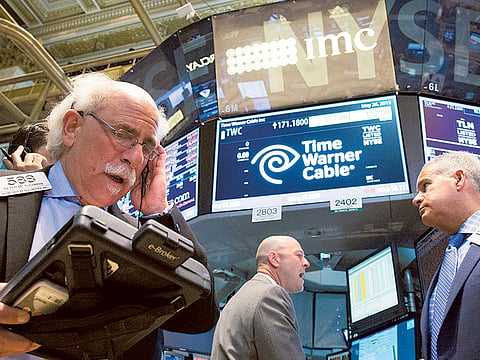US antitrust officials will need some convincing
But Charter officials quietly confident Time Warner Cable deal can sail through

New York, Washington: Charter Communications Inc, seeking to remake the US cable television industry by acquiring larger rival Time Warner Cable Inc for $56 billion (Dh205.5 billion), will try to skirt the regulatory obstacles that helped sink Comcast Corp’s earlier bid for Time Warner Cable.
The combined company would control a big swathe of the cable and internet markets, marking a huge step toward industry consolidation, long advocated by cable pioneer John Malone, Charter’s biggest shareholder. But before that can happen, the Federal Communications Commission will “look to see how American consumers would benefit if the deal were to be approved,” said the agency’s chairman, Tom Wheeler.
The agreement is the latest example of how cable companies are grappling with declining subscriber numbers as viewers shift to cheaper and more flexible streaming services offered by Netflix Inc, Amazon.com Inc, Hulu and others.
Even premium cable network HBO, owned by Time Warner Cable’s former parent, recently started a stand-alone streaming service. Charter and others have been beefing up their higher-margin internet businesses through consolidation and partnerships to offset TV subscriber losses.
That market power is likely to be regulators’ main focus. The combined companies would control about one-fifth of the US broadband internet market, according to research firm MoffettNathanson.
The merged company would still be smaller than Comcast, which serves about one-third of US broadband users, said analyst Craig Moffett. He added that “one has to be sober about genuine risks that this deal could still be rejected.”
Still, experts said the transaction is different enough from the scuttled Comcast takeover that it is likely to win regulatory approval with certain conditions. “This is a qualitatively different deal,” said Adonis Hoffman, former chief of staff to FCC Commissioner Mignon Clyburn.
“The regulatory hurdles will be lower on this transaction primarily because you don’t have the same public interest concerns that you had with Comcast, in additional to a smaller total footprint across the nation.
Potential abuses
Executives from Charter and Time Warner Cable said concerns were overblown that the deal could face the same opposition as the Comcast takeover did. “It’s a smaller company so some of the concerns that were raised about potential abuses of a larger company don’t pertain here,” Time Warner Chief Executive Rob Marcus said.
“It is also the case that we don’t have any of the other complications that arose out of Comcast being a vertically integrated media company with a broadcast network, a movie studio, a national cable network,” he said.
Charter CEO Tom Rutledge said the combined company would bring back customer service jobs to the US that have been outsourced to offshore calling centers. “We plan to use in-house people to do service and transactions, and all that leads to higher quality, which actually reduces costs as your get better customer experiences,” he said.
Comcast walked away last month from the deal to buy Time Warner Cable for $45 billion, citing regulatory concerns. Now the pressure is on Malone, a 74-year-old billionaire dubbed the ‘King of Cable’, to show that he can complete a deal that slipped away from his larger rival.
The Charter-Time Warner Cable deal would likely be approved by the Justice Department’s Antitrust Division but could face conditions at the Federal Communications Commission, said Gene Kimmelman, who worked at the Justice Department.
“It’s more of an FCC focus and there they have still a heavy lift. Will cable prices go up? Will broadband prices go up?” said Kimmelman, now president of public interest group Public Knowledge. He added that the regulators’ review would also focus on developing internet video competition.
If the deal is blocked, Charter would be on the hook for a $2 billion break-up fee.



